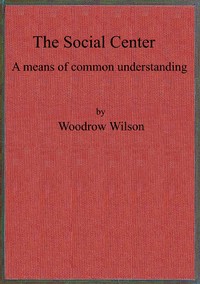| Author |
Wilson, Woodrow, 1856-1924 |
| LoC No. |
e12000977
|
| Title |
The social center : a means of common understanding. An address delivered by the Hon. Woodrow Wilson, Governor of New Jersey, before the First National Conference on Civic and Social Center Development, at Madison, Wis., October 25, 1911
|
| Original Publication |
Madison: The University of Wisconsin, 1911.
|
| Series Title |
Bulletin of the University of Wisconsin, serial no. 470; General series, no. 306
|
| Credits |
Bob Taylor, Charlene Taylor and the Online Distributed Proofreading Team at https://www.pgdp.net (This file was produced from images generously made available by The Internet Archive/American Libraries.
|
| Summary |
"The Social Center: A Means of Common Understanding" by Hon. Woodrow Wilson is a significant address that forms part of the University of Wisconsin's Extension Division publications, likely written in the early 20th century, specifically around 1911. This type of book is a civic and social discourse that centers around the idea of utilizing schoolhouses as communal meeting spaces to foster civic engagement and social cohesion. The address conveys Wilson's vision for the social center movement, which emphasizes the importance of establishing platforms for community dialogue and interaction to nurture understanding among diverse population segments. In this address, Wilson articulates the concept that schoolhouses should serve as civic centers for communities, facilitating gatherings for education, entertainment, and social interaction after school hours. He observes that communities thrive when individuals from different backgrounds come together, sharing their thoughts and feelings, ultimately fostering a more unified society. By encouraging direct communication and collaboration, Wilson believes misunderstandings can be diminished, leading to a stronger sense of community and improved civic life. He posits that through this movement, communities can nurture a deeper appreciation of common interests, thereby fortifying democracy and ensuring a more equitable society. (This is an automatically generated summary.)
|
| Language |
English |
| LoC Class |
LC: Education: Special aspects of education
|
| Subject |
Recreation centers
|
| Category |
Text |
| EBook-No. |
72293 |
| Release Date |
Dec 2, 2023 |
| Most Recently Updated |
Dec 8, 2023 |
| Copyright Status |
Public domain in the USA. |
| Downloads |
42 downloads in the last 30 days. |
|
Project Gutenberg eBooks are always free!
|

